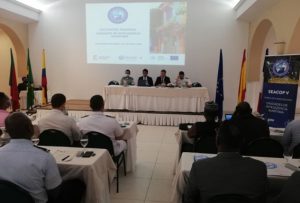
27/07/2022
The programme held a Regional Meeting of Maritime Intelligence Units of Latin America and the Caribbean in Cartagena de Indias (Colombia), where it addressed the gender perspective and the establishment of Maritime Intelligence Units
The objective of SEACOP V, a European programme co-led by the FIIAPP, is to support and strengthen the fight against maritime trafficking of illicit flows. In this regional meeting, it has been established to work in Maritime Intelligence Units (MIU) and to strengthen collaboration between them.
To this end, the heads of the MIUs of all the countries in the region met in Cartagena de Indias to share the maritime traffic situation and to establish the needs for strengthening the project. In this way, the modus operandi used by criminal organisations, the new routes detected and the new criminal organisations that are operating from Latin America were studied in depth. Taking into account this international approach, different foreign agencies, as well as representatives from West African countries, also participated in the meeting. “We hope to establish links with representatives of other institutions to strengthen the approach at the regional level,” said Deputy Commissioner Gastón Cidre of the Argentinean Navy.

The meeting was opened by the Director of SEACOP V, the Colombian Foreign Ministry, senior representatives of the Colombian Navy and Police, as well as the Ambassador of the European Union in Colombia. The meeting contributed to strengthening the capacities of the Units at regional level to increase their effectiveness through the exchange of maritime information, as well as to raise and address shared concerns with a collective, regional and global approach.
In addition, a specific session dedicated to the gender approach of the project has been held. In this way, the project seeks to incorporate a gender perspective to improve the effectiveness of law enforcement and help combat stereotypes and discrimination. To this end, the European project has recently adopted its “Gender Mainstreaming Guide”.
In order to get a broader picture, case studies have been analysed and discussions on the issues raised have been proposed. In addition, testimonies from female officials who attended the event were shared. “Women have not had it easy, we have encountered obstacles and reluctance from our own colleagues. However, we continue to try to demonstrate our capabilities. We are an important asset for covert and intelligence activities,” says Sara Morán, from the National Customs Service of Ecuador.



